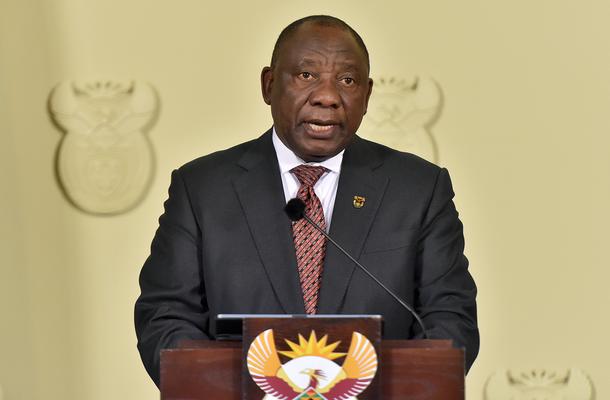Deputy minister of state security Zizi Kodwa and Transport Minister Fikile Mbalula reportedly each received R40,000 on January 3.

South Africa - Pretoria - 21 July 2019 - President Cyril Ramaphosa briefs the media on the Public Protector's report on the allegations that he violated the Executive Ethics Code at the Union Buildings. Picture: Bongani Shilubane/African News Agency (ANA)
While details of who received what in relation to Cyril Ramaphosa’s campaign to become president of the ANC continue to be shared on social media, City Press is reporting that disparity in payments among campaigners is causing rifts.
Information that is publicly available shows how millions were withdrawn from one of the campaign’s three bank accounts.
According to the publication about R13m was withdrawn from a Linkd Environmental Services account and paid to those on the ground doing grassroots lobbying for Rampahosa’s bid to be ANC president.
The Linkd Environmental Services account is in the name of a company owned by Lungile Ngubane, who City Press reports is the fiancee of Vukani Mdabe, the C17 campaign co-ordinator in KwaZulu-Natal.
When City Press approached Ngubane, she referred all questions to Mdabe. He told the publication that he used his partner’s company to distribute the funds across the province during the campaign, as there was no time to set up an alternative.
According to the records, Ngubane’s company received funds in 59 transactions between August 2017 and January 2019.
According to City Press, ANC MP Bernice Swarts received R16m from the Linkd Environmental Services account in the name of her company, Tomberry Trading Enterprises. She was also paid in her personal capacity.
It is understood that Swarts was meant to faciliatate support for Ramaphosa in Mpumalanga. SA Students’ Congress (Sasco) president Avela Mjajubana also reportedly received R800,000 in his personal capacity.
Sasco’s general-secretary Moipone Mhlongo told the publication that it distanced itself from the money that Mjajubana received, saying he had brought the organisation into disrepute.
According to City Press, deputy minister of state security Zizi Kodwa and Transport Minister Fikile Mbalula each received R40,000 on January 3. Kodwa denied to the publication that this was the case, while Mbalula declined to comment.
One former Ramaphosa campaigner, who was unnamed, told City Press that while they were unaware of the amounts floating around, they felt the way the money was distributed was unjust.
On Saturday, journalist Oliver Meth who has written for Daily Maverick and Daily Vox openly admitted on his Twitter feed that he was paid for work that he did for the Ramphosa campaign, reports Citizen.
“I’d like to place on record, that I worked as a media consultant on the campaign and was paid for services rendered, as a freelancer,” Meth tweeted. He further stated that he was unable to provide more details as he had signed a non-disclosure agreement.
The Citizen reported that in his biography on the Daily Maverick site he is transparent about having been a “communications consultant” on the CR17 campaign. Meth has also worked as a spokesperson for Greenpeace Africa.
It’s unclear if the information on social media is related to the documentation that Public Protector Busisiwe Mkhwebane used when she investigated the R500,000 donation that Ramaphosa’s campaign had received from former CEO of Bosasa (now African Global Operations), Gavin Watson.
Last week, following a meeting between Deputy Judge President Aubrey Ledwaba and attorneys for Ramaphosa and Mkhwebane it was decided that the records used in the Public Protector’s investigation would remain sealed, reported News24.
Lawyers for Mkhwebane filed the documents with the Gauteng High Court in Pretoria on Wednesday as part of the ongoing review application brought by the president of her report.
The documents, including bank statements and emails, constitute the evidence Mkhwebane relied on in findings against Ramaphosa, particularly her findings of suspected money laundering and that Ramaphosa deliberately misled Parliament.
In recent weeks, some of this evidence has been leaked to the media. The remaining documents will now be scrutinised by Ramaphosa’s legal team who will have until August 26 to raise objections to other documents being made part of the public record.
Mkhwebane’s office confirmed to News24 on Wednesday that the the bank statements she had relied on in her report were obtained from the Financial Intelligence Centre (FIC).
Speaking to News24 on Wednesday, the Public Protector’s spokesperson, Oupa Segalwe, said: “The Public Protector takes serious exception to insinuations by the attorneys of the president as well as the Presidency in media statements that she obtained information illegally and as they say that to the public, they are not providing any evidence to back up those statements.
“The Public Protector does not take kindly to that kind of conduct.”
Segalwe said the Public Protector had signed a memorandum of “understanding” with the FIC and that was where she obtained the bank statements she made reference to in her report.
“When Absa was not forthcoming with regards to the subpoena that was served on it, we did not pursue them because we were able to obtain the same information through the FIC. It is the statutory body that has access to those things.
“It can’t be that when you obtain information from a statutory body like that, which is in the business of providing the same records, then you are accused of being in possession of documents unlawfully without any evidence,” he said.
For more news your way, download The Citizen’s app for iOS and Android.
Download our app